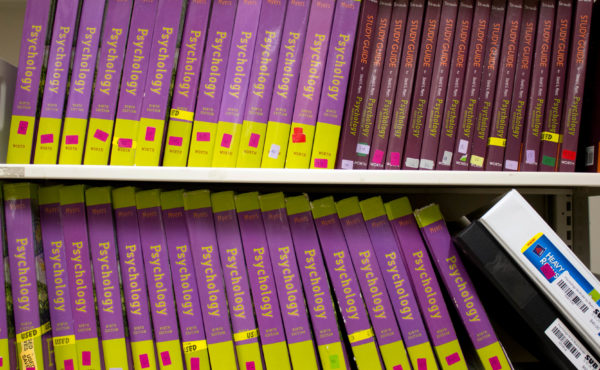SUBtext, the UVSS’s non-profit textbook consignment store, has estimated a loss of $40-50 000 per term on unsold textbooks. From 2013–2014, the estimated loss was $72 000.
Roxie Price, SUBtext’s manager since May 2013, has witnessed this loss as it became a widespread issue. Price says the losses can be attributed mostly to lower-level science courses, those with hundreds of students, each requiring a textbook with a single-use online component.

This psychology textbook had a healthy cycle compared to other textbooks, which sit on shelves unable to be used because of an online component. Photo by The Martlet.
“It’s really frustrating when students do need a book, but because of an online component, they do not have the option of buying a used textbook,” she said. “So not only do we end up with large quantities of books unsold, but the older they become, the more obsolete they become, so you can’t sell them to other schools.”
Online course packs are secured under the plastic shrink wrap of a new textbook and can’t be resold once used or opened. These online components have only grown more prominent in recent years as techno-logical advances became more integrated in students’ education.
On the other hand, custom edition textbooks, given a unique ISBN to the University of Victoria and impossible to sell anywhere else, have also become an issue. According to Price, some courses will shift between custom and regular editions, year after year. “But inside that special hardcover is a regular book,” she said.
“We might take a book throughout the entire summer and have 100 copies of it, and then find out in August that [the university’s not even using that book anymore,” she said. “Now we have to keep them on the shelf because we’re legally bound by the contracts that consignors sign when they bring them in. If that book isn’t going to sell, it’s a bit of a waste of time for everyone.”
In rare circumstances, some textbooks will experience very “healthy cycles,” Price said. These allow students to purchase a used book and resell it once more at the end of the term. PSYC 100A and B, for example, is switching to a new edition of their textbook this September, after using the same book for five to six years.
Bruce Ravelli, an assistant teaching professor in Sociology, has offered SOC 100 students the opportunity to purchase his online component separately from two different editions of his textbook. This information appears on the book list available to SUBtext before an academic term, according to Price.
“This is an example of a prof who provides really good information,” Price said. “You very very rarely see this much information in the book list.”
According to Ravelli, author of Exploring Sociology, the online component for his textbook is a “separate entity” from the publisher, Pearson Education, which allows students to pair the $16 purchase with a used textbook.
“I can honestly say that while Pearson [Education] is there to make money, there has never been a decision around what I wanted to do with my textbooks/online resources, or what I thought was in the best interests of my students that was driven by their financial ‘bottom line,’” Ravelli said via email.
When it comes to custom textbooks, Ravelli said from what he knows it would be “very rare,” and “just not worth it” for a major publisher to target a single campus.
UVSS chairperson Brontë Renwick-Shields says she will be contacting the Faculty Association to encourage professors to choose textbooks without online components, and meet with UVic administration to seek solutions. Textbook sales will also be a part of the UVSS’s post-secondary education campaign, Education is a Right.
“My immediate reaction was that the inability to buy used books makes post-secondary education even more unaffordable,” she said via email.
“It is further adding to already high tuition and living costs, and it’s unfair to students.”
Editor’s note: The print version of this article stated that Roxie Price started working as manager of SUBtext in September 2012. She actually started in May 2013. We have updated the article to reflect this and regret the error.







